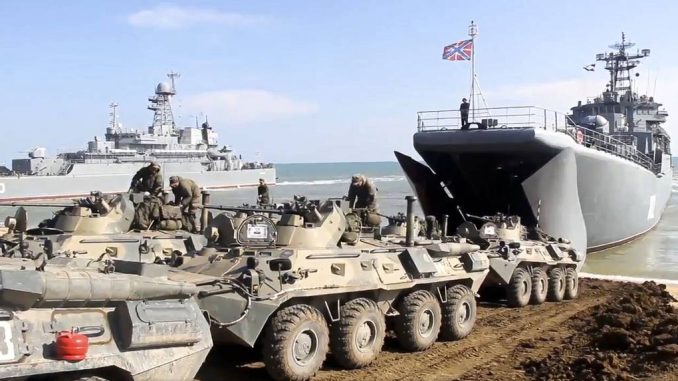
MOSCOW (AP) — The Kremlin voiced concern Thursday about a possible escalation of fighting in a separatist conflict in eastern Ukraine as the U.S. issued a strong warning to Russia to stay away from Ukraine.
Ukrainian and Western officials have worried about a Russian troop buildup near Ukraine, fearing it could herald an invasion. But Moscow has insisted it has no such intention and accused Ukraine and its Western backers of making up the claims to cover up their own allegedly aggressive designs.
U.S. Secretary of State Antony Blinken warned Russian Foreign Minister Sergey Lavrov at their meeting in Stockholm on Thursday that “if Russia decides to pursue confrontation, there will be serious consequences,” adding that “the best way to avert a crisis is through diplomacy.”
RELATED
:quality(70)/cloudfront-us-east-1.images.arcpublishing.com/mco/SEFFFRSVUBGR5HRJUMG2EHYL6M.jpg)
Kremlin spokesman Dmitry Peskov said in Moscow that “the Ukrainian authorities’ aggressive and increasingly intensive provocative action on the line of contact” gives grounds for concerns about a possible flare-up of hostilities. He said that recent statements from Ukrainian President Volodymyr Zelenskyy and other Ukrainian officials indicate that “the Ukrainian leadership doesn’t exclude a forceful scenario.”
“The probability of hostilities in Ukraine still remains high,” Peskov said in a conference call with reporters.
Denis Pushilin, the head of the self-proclaimed separatist republic in Donetsk, said on Russian state television that he could turn to Moscow for military assistance if the region faces a Ukrainian attack.
Ukrainian officials have denied an intention to reclaim the rebel regions by force.
The two ex-Soviet neighbors have remained locked in a tense tug-of-war after Russia annexed Ukraine’s Crimean Peninsula in 2014 following the ouster of the country’s Kremlin-friendly president and threw its weight behind a separatist insurgency in Ukraine’s eastern industrial heartland, known as the Donbas. More than 14,000 people have died in the fighting.
President Vladimir Putin has warned NATO against deploying its troops and weapons to Ukraine, saying it represented a red line for Russia and would trigger a strong response. He said Wednesday that Moscow would seek Western guarantees precluding any further NATO expansion and deployment of its weapons near Russia’s borders.
Blinken said “we have deep concerns about Russia’s plans for renewed aggression against Ukraine,” adding that “it’s a concern that is shared by many in Europe.” He was speaking during a meeting with Lavrov on the sidelines of a ministerial meeting of the Organization for Security and Cooperation in Europe in Stockholm.
Blinken reaffirmed that the U.S. has “a strong, ironclad commitment to the sovereignty and territorial integrity of Ukraine.”
Referring to a 2015 peace agreement for eastern Ukraine brokered by France and Germany and signed in Minsk, Belarus, Blinken called for a “full implementation of the Minsk agreements with Russia pulling back its forces.”
Moscow says it’s not a party to the deal between Ukraine and self-proclaimed separatist regions, and denies Ukrainian and Western assertions of sending its troops and weapons into eastern Ukraine.
In his speech at the OSCE meeting, Lavrov urged Ukraine to abide by its obligation with the Minsk agreement that envisages a broad autonomy for the rebel regions, warning that Kyiv’s refusal to honor it is a “way toward a catastrophe.”
He also warned Biden at their meeting that “any further NATO expansion eastward undoubtedly compromises our core security interests.”
The top Russian diplomat charged that the West is “playing with fire” when it argues that Russia doesn’t have a say in NATO’s expansion plans.
“I want to make it crystal clear: turning our neighbors into a bridgehead for confrontation with Russia, the deployment of NATO forces in the regions strategically important for our security is categorically unacceptable,” he told the OSCE meeting.
Lavrov followed up on Putin’s call for a new security arrangement, stating that reaching an agreement on a set of “long-term and legally binding security guarantees is imperative to prevent sliding into a confrontational scenario.”
Jan M. Olsen contributed to this report from Copenhagen, Denmark.


Be the first to comment